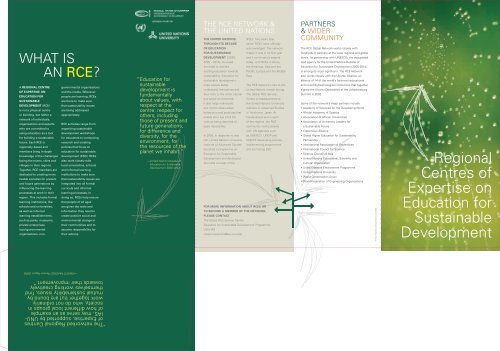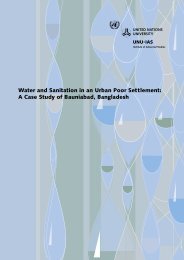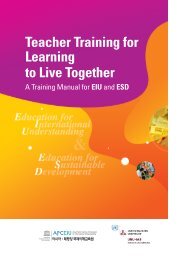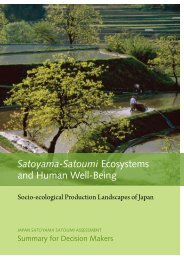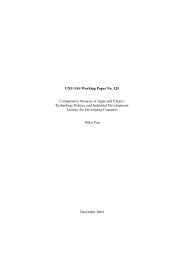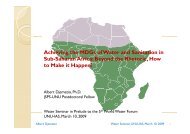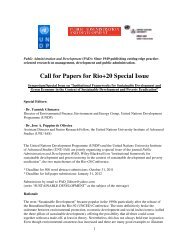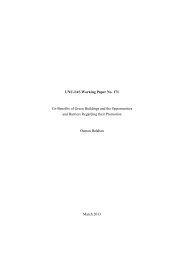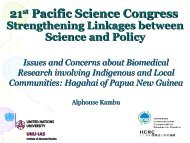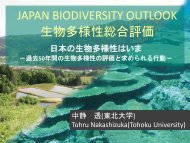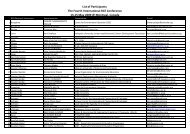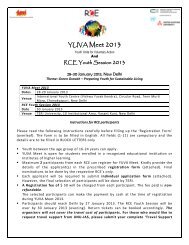Brochure: What is an RCE? - UNU-IAS - United Nations University
Brochure: What is an RCE? - UNU-IAS - United Nations University
Brochure: What is an RCE? - UNU-IAS - United Nations University
Create successful ePaper yourself
Turn your PDF publications into a flip-book with our unique Google optimized e-Paper software.
THE <strong>RCE</strong> NETWORK &<br />
THE UNITED NATIONS<br />
THE UNITED NATIONS,<br />
THROUGH ITS DECADE<br />
<strong>RCE</strong>s. Two years later,<br />
seven <strong>RCE</strong>s were officially<br />
PARTNERS<br />
& WIDER<br />
COMMUNITY<br />
OF EDUCATION<br />
acknowledged. The network<br />
The <strong>RCE</strong> Global Network works closely with<br />
WHAT IS<br />
AN <strong>RCE</strong>?<br />
A REGIONAL CENTRE<br />
OF EXPERTISE ON<br />
EDUCATION FOR<br />
SUSTAINABLE<br />
DEVELOPMENT (<strong>RCE</strong>)<br />
<strong>is</strong> not a physical centre<br />
or building, but rather a<br />
network of individuals,<br />
org<strong>an</strong><strong>is</strong>ations <strong>an</strong>d experts<br />
who are committed to<br />
using education as a tool<br />
for building a sustainable<br />
future. Each <strong>RCE</strong> <strong>is</strong><br />
regionally-based <strong>an</strong>d<br />
members bring in-depth<br />
knowledge of the challenges<br />
facing the towns, cities <strong>an</strong>d<br />
villages in their regions.<br />
Together, <strong>RCE</strong> members are<br />
dedicated to creating more<br />
livable societies for present<br />
<strong>an</strong>d future generations by<br />
influencing the learning<br />
processes at work in their<br />
region. Th<strong>is</strong> includes formal<br />
learning institutions, like<br />
schools <strong>an</strong>d universities,<br />
as well as informal<br />
learning establ<strong>is</strong>hments,<br />
such as parks, museums,<br />
private enterpr<strong>is</strong>es,<br />
local governmental<br />
org<strong>an</strong><strong>is</strong>ations, nongovernmental<br />
org<strong>an</strong><strong>is</strong>ations<br />
<strong>an</strong>d the media. Wherever<br />
people are learning, <strong>RCE</strong>s<br />
are there to make sure<br />
that sustainability <strong>is</strong>sues<br />
are being addressed<br />
appropriately.<br />
<strong>RCE</strong> activities r<strong>an</strong>ge from<br />
org<strong>an</strong>izing sustainable<br />
development workshops<br />
for educators to conducting<br />
research <strong>an</strong>d creating<br />
policies that focus on<br />
education for sustainable<br />
development (ESD). <strong>RCE</strong>s<br />
also work closely with<br />
local universities, schools<br />
<strong>an</strong>d informal learning<br />
institutions to make sure<br />
that sustainability <strong>is</strong>sues are<br />
integrated into all formal<br />
curricula <strong>an</strong>d informal<br />
learning processes. In<br />
doing so, <strong>RCE</strong>s help ensure<br />
that people of all ages<br />
are given the tools <strong>an</strong>d<br />
information they need to<br />
create positive social <strong>an</strong>d<br />
environmental ch<strong>an</strong>ge in<br />
their communities <strong>an</strong>d to<br />
assume responsibility for<br />
their actions.<br />
“ Education for<br />
sustainable<br />
development <strong>is</strong><br />
fundamentally<br />
about values, with<br />
respect at the<br />
centre: respect for<br />
others, including<br />
those of present <strong>an</strong>d<br />
future generations,<br />
for difference <strong>an</strong>d<br />
diversity, for the<br />
environment, for<br />
the resources of the<br />
pl<strong>an</strong>et we inhabit.”<br />
— <strong>United</strong> <strong>Nations</strong> Decade of<br />
Education for Sustainable<br />
Development 2005–2014<br />
FOR SUSTAINABLE<br />
DEVELOPMENT (DESD,<br />
2005 – 2014), stressed<br />
the need to reorient<br />
ex<strong>is</strong>ting education towards<br />
sustainability. Education for<br />
sustainable development<br />
helps people better<br />
underst<strong>an</strong>d themselves <strong>an</strong>d<br />
their links to the wider natural<br />
<strong>an</strong>d social environment;<br />
it also helps individuals<br />
<strong>an</strong>d communities adopt<br />
behaviours <strong>an</strong>d practices that<br />
enable all to live a full life<br />
without being deprived of<br />
basic necessities.<br />
In 2003, in response to that<br />
call, <strong>United</strong> <strong>Nations</strong> <strong>University</strong><br />
Institute of Adv<strong>an</strong>ced Studies<br />
launched a programme on<br />
Education for Sustainable<br />
Development <strong>an</strong>d developed<br />
the initial concept of the<br />
tripled in size in its first year<br />
<strong>an</strong>d it continues to exp<strong>an</strong>d<br />
today, with <strong>RCE</strong>s in Africa,<br />
the Americas, Asia <strong>an</strong>d the<br />
Pacific, Europe <strong>an</strong>d the Middle<br />
East.<br />
The <strong>RCE</strong> Network’s ties to the<br />
<strong>United</strong> <strong>Nations</strong> remain strong.<br />
The Global <strong>RCE</strong> Service<br />
Centre <strong>is</strong> headquartered at<br />
the <strong>United</strong> <strong>Nations</strong> <strong>University</strong><br />
Institute of Adv<strong>an</strong>ced Studies<br />
in Yokohoma, Jap<strong>an</strong>. At<br />
headquarters <strong>an</strong>d in each<br />
of the regions, the <strong>RCE</strong><br />
community works closely<br />
with UN agencies such<br />
as UNESCO, UNDP <strong>an</strong>d<br />
UNICEF developing policies,<br />
implementing programmes<br />
<strong>an</strong>d promoting ESD.<br />
FOR MORE INFORMATION ABOUT <strong>RCE</strong>S OR<br />
TO BECOME A MEMBER OF THE NETWORK,<br />
PLEASE CONTACT<br />
The Global <strong>RCE</strong> Service Centre<br />
Education for Sustainable Development Programme<br />
<strong>UNU</strong>-<strong>IAS</strong><br />
rceservicecentre@ias.unu.edu<br />
hundreds of partners at the local, regional <strong>an</strong>d global<br />
levels. Its partnership with UNESCO, the designated<br />
lead agency for the <strong>United</strong> <strong>Nations</strong> Decade of<br />
Education for Sustainable Development 2005-2014,<br />
<strong>is</strong> among its most signific<strong>an</strong>t. The <strong>RCE</strong> Network<br />
also works closely with the Ubuntu Alli<strong>an</strong>ce, <strong>an</strong><br />
alli<strong>an</strong>ce of 14 of the world’s foremost educational<br />
<strong>an</strong>d scientific/technological institutions that together<br />
signed the Ubuntu Declaration at the Joh<strong>an</strong>nesburg<br />
Summit in 2002.<br />
Some of the network’s major partners include:<br />
• Academy of Sciences for the Developing World<br />
• Afric<strong>an</strong> Academy of Science<br />
• Association of Afric<strong>an</strong> Universities<br />
• Association of <strong>University</strong> Leaders for<br />
a Sustainable Future<br />
• Copernicus Alli<strong>an</strong>ce<br />
• Global Higher Education for Sustainability<br />
Partnership<br />
• International Association of Universities<br />
• International Council for Science<br />
• Science Council of Asia<br />
• <strong>United</strong> <strong>Nations</strong> Educational, Scientific <strong>an</strong>d<br />
Cultural Org<strong>an</strong>ization<br />
• <strong>United</strong> <strong>Nations</strong> Environment Programme<br />
• <strong>United</strong> <strong>Nations</strong> <strong>University</strong><br />
• World Conservation Union<br />
• World Federation of Engineering Org<strong>an</strong><strong>is</strong>ations<br />
PHOTO CREDITS: © ISTOCKPHOTO / © CORBIS<br />
Regional<br />
Centres of<br />
Expert<strong>is</strong>e on<br />
Education for<br />
Sustainable<br />
Development<br />
“ The networked Regional Centres<br />
of Expert<strong>is</strong>e, supported by <strong>UNU</strong>-<br />
<strong>IAS</strong>, may serve as <strong>an</strong> example<br />
of how different local groups in<br />
society, who do not ordinarily<br />
work together but are bound by<br />
mutual sustainability <strong>is</strong>sues, find<br />
themselves working creatively<br />
towards their improvement.”<br />
—UNESCO Mid-DESD Review Report (2009)
REGIONAL CENTRES OF EXPERTISE<br />
As of April 2012<br />
AFRICA &<br />
MIDDLE EAST<br />
Cairo, Egypt<br />
Gh<strong>an</strong>a<br />
Greater Mbarara, Ug<strong>an</strong>da<br />
Greater Nairobi, Kenya<br />
Jord<strong>an</strong><br />
Kakamega-Western Kenya<br />
K<strong>an</strong>o, Nigeria<br />
Khmomas-Erongo, Namibia<br />
Kuwa-Zulu Natal, South Africa<br />
Lagos, Nigeria<br />
Lesotho<br />
Mak<strong>an</strong>a & Rural Eastern Cape,<br />
South Africa<br />
Maputo, Mozambique<br />
Mau Ecosystem Complex,<br />
Kenya<br />
Minna, Nigeria<br />
Senegal<br />
Swazil<strong>an</strong>d<br />
Zomba, Malawi<br />
THE AMERICAS<br />
Bogota, Colombia<br />
Brit<strong>is</strong>h Columbia (North<br />
Cascades), C<strong>an</strong>ada<br />
Chaco, Argentina<br />
Curitiba-Par<strong>an</strong>a, Brazil<br />
Gr<strong>an</strong>d Rapids, USA<br />
Greater Sudbury, C<strong>an</strong>ada<br />
Guatemala<br />
Lima-Callao, Peru<br />
Montreal, C<strong>an</strong>ada<br />
North Texas, USA<br />
Rio de J<strong>an</strong>eiro, Brazil<br />
São Paulo, Brazil<br />
Saskatchew<strong>an</strong>, C<strong>an</strong>ada<br />
T<strong>an</strong>tramar, C<strong>an</strong>ada<br />
Toronto, C<strong>an</strong>ada<br />
Western Jal<strong>is</strong>co, Mexico<br />
ASIA-PACIFIC<br />
Anji, China<br />
Arunachal Pradesh, India<br />
B<strong>an</strong>galore, India<br />
Beijing, China<br />
Bogor, Indonesia<br />
Bohol, Philippines<br />
Cebu, Philippines<br />
Cha-am, Thail<strong>an</strong>d<br />
Ch<strong>an</strong>digarh, India<br />
Chubu, Jap<strong>an</strong><br />
Delhi, India<br />
East Kalim<strong>an</strong>t<strong>an</strong>, Indonesia<br />
Gippsl<strong>an</strong>d, Australia<br />
Goa<br />
Greater Dhaka (IUBAT),<br />
B<strong>an</strong>gladesh<br />
Greater Phnom Penh,<br />
Cambodia<br />
Greater Sendai, Jap<strong>an</strong><br />
Greater Western Sydney,<br />
Australia<br />
Guwahati, India<br />
Hyogo-Kobe, Jap<strong>an</strong><br />
Ilocos, Philippines<br />
Incheon, Republic of Korea<br />
Kitakyushu, Jap<strong>an</strong><br />
Kodagu, India<br />
Kyrgyzst<strong>an</strong><br />
Lucknow, India<br />
Mumbai, India<br />
Northern Mind<strong>an</strong>ao,<br />
Philippines<br />
Okayama, Jap<strong>an</strong><br />
Pacific Isl<strong>an</strong>d Countries<br />
Pen<strong>an</strong>g, Malaysia<br />
Pune, India<br />
Sh<strong>an</strong>gri-la, China<br />
Southern Vietnam<br />
Srinagar, India<br />
Tongyeong, Republic of Korea<br />
Tr<strong>an</strong>g, Thail<strong>an</strong>d<br />
Ulju, Republic of Korea<br />
Western Australia<br />
Yogyakarta, Indonesia<br />
Yokohama, Jap<strong>an</strong><br />
EUROPE<br />
Açores, Portugal<br />
Barcelona, Spain<br />
Central Macedonia, Greece<br />
Creias-Oeste, Portugal<br />
Crete, Greece<br />
Denmark<br />
East Midl<strong>an</strong>ds, UK<br />
Espoo, Finl<strong>an</strong>d<br />
Graz-Styria, Austria<br />
Hamburg, Germ<strong>an</strong>y<br />
Irel<strong>an</strong>d<br />
London, UK<br />
Munich, Germ<strong>an</strong>y<br />
Nizhny Novgorod, Russia<br />
North East, UK<br />
Nuremberg, Germ<strong>an</strong>y<br />
Oldenburger Münsterl<strong>an</strong>d,<br />
Germ<strong>an</strong>y<br />
Porto Metropolit<strong>an</strong> Area,<br />
Portugal<br />
Rhine-Meuse<br />
Samara, Russia<br />
Severn, UK<br />
Skåne, Sweden<br />
Southern North Sea<br />
Vienna, Austria<br />
Wales, UK<br />
Yorkshire & Humberside, UK<br />
<strong>RCE</strong>s<br />
IN ACTION<br />
There are more th<strong>an</strong> 100 Regional Centres<br />
of Expert<strong>is</strong>e on Education for Sustainable<br />
Development operating worldwide.<br />
Each <strong>RCE</strong> empowers people within its community to lead better, more sustainable<br />
lives by providing them with the information, education <strong>an</strong>d tools they<br />
need to create positive social <strong>an</strong>d environmental ch<strong>an</strong>ge.<br />
By creating diverse partnerships among educators, researchers, policy-makers,<br />
scient<strong>is</strong>ts, youth, leaders within indigenous communities <strong>an</strong>d throughout the<br />
public, private <strong>an</strong>d NGO sectors, <strong>RCE</strong>s are able to provide a framework for<br />
strategic thinking <strong>an</strong>d action on sustainability, creating t<strong>an</strong>gible improvements<br />
in their communities. Indeed, partnerships are at the heart of each individual<br />
<strong>RCE</strong> <strong>an</strong>d of the global <strong>RCE</strong> network.<br />
WHAT MAKES <strong>RCE</strong>s UNIQUE?<br />
<strong>RCE</strong>S THINK GLOBALLY<br />
BUT ACT LOCALLY. With<br />
their official links to UN<br />
agencies, formal education<br />
institutions, <strong>an</strong>d informal<br />
educators worldwide,<br />
<strong>RCE</strong>s are the best keepers<br />
of knowledge around<br />
sustainability challenges in<br />
their home regions.<br />
The <strong>RCE</strong> network brings<br />
together multi-sectoral <strong>an</strong>d<br />
interd<strong>is</strong>ciplinary members<br />
who might not usually work<br />
together. As such, they are<br />
uniquely placed to help create<br />
solutions to these challenges<br />
through dialogue, education<br />
<strong>an</strong>d learning.<br />
<strong>RCE</strong>s ensure that the<br />
m<strong>an</strong>y facets of sustainable<br />
development have a place<br />
in primary, secondary <strong>an</strong>d<br />
tertiary education <strong>an</strong>d<br />
research, as well as in<br />
informal learning spaces.<br />
Through these efforts, <strong>RCE</strong>s<br />
help prepare local leaders<br />
of tomorrow with the tools<br />
<strong>an</strong>d information they need to<br />
make smart <strong>an</strong>d sustainable<br />
choices for the future.<br />
<strong>RCE</strong> efforts encourage<br />
innovation <strong>an</strong>d new<br />
approaches to sustainable<br />
development. They tr<strong>an</strong>slate<br />
ex<strong>is</strong>ting knowledge into<br />
concrete actions <strong>an</strong>d<br />
empower individuals to<br />
make sustainable choices<br />
for themselves <strong>an</strong>d their<br />
communities.<br />
The success each <strong>RCE</strong><br />
achieves on the local level <strong>is</strong><br />
brought to scale through the<br />
global <strong>RCE</strong> Network of more<br />
th<strong>an</strong> 100 <strong>RCE</strong>s worldwide.<br />
Local knowledge, expert<strong>is</strong>e<br />
<strong>an</strong>d best practices are shared<br />
globally through the network<br />
<strong>an</strong>d are able to be adapted<br />
<strong>an</strong>d applied successfully in<br />
other regions. <strong>RCE</strong>s also play<br />
a central role in the tr<strong>an</strong>sfer<br />
of global technologies,<br />
knowledge <strong>an</strong>d experiences<br />
at the local level, through their<br />
programmes <strong>an</strong>d activities.


